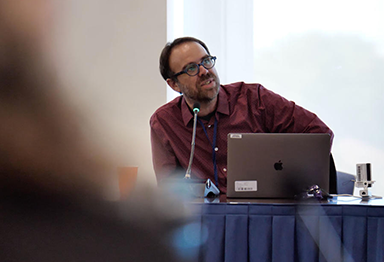
Byram H. Ozer, M.D., Ph.D.
- Center for Cancer Research
- National Cancer Institute
- Building 82, Room 217
- Bethesda, MD 20892
- 301-480-5124
- byram.ozer@nih.gov
RESEARCH SUMMARY
Dr. Ozer is a neuro-oncologist who cares for patients with rare brain and spine tumors as part of the NCI-CONNECT (Comprehensive Oncology Network Evaluating Rare CNS Tumors) program at the Neuro-Oncology Branch (NOB). His interests encompass clinical research—designing clinical trial protocols to test new therapeutics and novel combinations—as well as translational research that uses scientific advancements to understand the cellular processes underlying tumor development and progression. These interests span disciplines, and Dr. Ozer works with diverse groups of clinical and scientific collaborators in neurosurgery, neuropathology, radiation oncology, neuro-radiology, and genetic counseling.
Explore the NOB's Research Programs >
Areas of Expertise
Information for Patients
Learn more about our clinical trials and the highly specialized care teams that lead them.
Research
At the Neuro-Oncology Branch (NOB), Dr. Ozer investigates the molecular mechanisms of tumor development and progression in rare central nervous system (CNS) tumors, with a particular focus on aggressive and treatment-refractory meningiomas. Meningiomas are frequently benign, and many are manageable with surgery and/or radiation. However, there are limited treatment options when these tumors behave aggressively. Dr. Ozer’s research aims to use emerging categorizations of meningiomas by methylation class and mutational analyses to better understand their metabolic and cell signaling changes and develop more tailored therapies. Because meningiomas are not constricted by the blood brain barrier, Dr. Ozer studies circulating biomarkers to monitor drug and immunological responses, as well as tumor progression and stability. He also seeks to leverage the many resources and experiences in the NOB's outcomes research, in order to improve quality of life and long-term symptom management for patients living with meningiomas.
In addition, Dr. Ozer oversees the NOB’s first-in-human trial investigating ONC206, an oral cancer therapy. The trial is testing the dosing and safety of ONC206 in adult patients with recurrent rare brain and spine tumors. The dose and schedule determined in this phase I trial will be used for next phase studies, which determine if ONC206 is an effective treatment that can improve outcomes for patients.
Publications
High-grade glioma therapy: adding flexibility in trial design to improve patient outcomes
TSC2 alterations in anaplastic ependymoma progression to ependymosarcoma
SPINT2 is hypermethylated in both IDH1 mutated and wild-type glioblastomas, and exerts tumor suppression via reduction of c-Met activation
D-2-Hydroxyglutarate is necessary and sufficient for isocitrate dehydrogenase 1 mutant-induced MIR148A promoter methylation
Activity and cellular localization of an oncogenic glioblastoma multiforme-associated EGF receptor mutant possessing a duplicated kinase domain
Biography

Byram H. Ozer, M.D., Ph.D.
Dr. Ozer completed a double major in biology and chemistry at New College of Florida before spending a year at the Max Planck Institute for Colloid Chemistry in Golm, Germany as a Fulbright Scholar. There, he studied self-assembly mechanisms of biomolecules in the laboratory of Charl FJ Faul. Dr. Ozer subsequently matriculated into the NIH-sponsored Medical Scientist Training Program at University of Wisconsin School of Medicine and Public Health, where he received both his M.D. and Ph.D.
He performed his dissertation work in the laboratory of Paul J. Bertics, exploring the role that the EGFR oncogene plays in the development of glioblastoma when mutated, and also using it as a model to study liquid crystal biosensor technology. He did his medical internship at Good Samaritan Hospital in Cincinnati, Ohio, before moving to the University of California, Los Angeles to complete both his neurology residency and his clinical and research fellowship in neuro-oncology. During this fellowship, he performed research in the laboratory of Albert M. Lai, characterizing epilepsy preponderance and exploring epigenetic and hypermutation changes in IDH-mutated gliomas. He subsequently started as an assistant professor at the Johns Hopkins Sidney Kimmel Cancer Center, with a primary appointment at their Washington, DC cancer center at Sibley Memorial Hospital. In 2022, Dr. Ozer joined the NCI-CONNECT (Comprehensive Oncology Network Evaluating Rare CNS Tumors) program to focus on rare CNS tumors. He is board certified in neurology from the American Board of Psychiatry and Neurology (ABPN) as well as in neuro-oncology from the United Council for Neurologic Subspecialties (UCNS).
News
New Research Physician Helps Fight Rare Brain Tumors with Knowledge
November 23, 2022
Dr. Byram Ozer joins NCI-CONNECT to help care for and educate patients, while bringing together medical professionals to learn new skills and treatment approaches. Read more >
